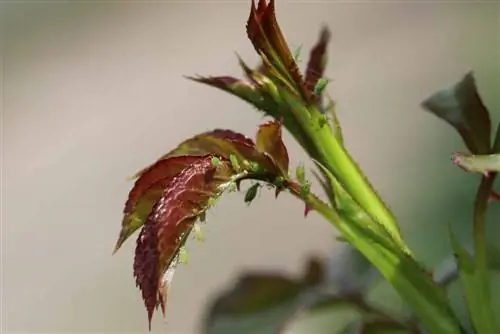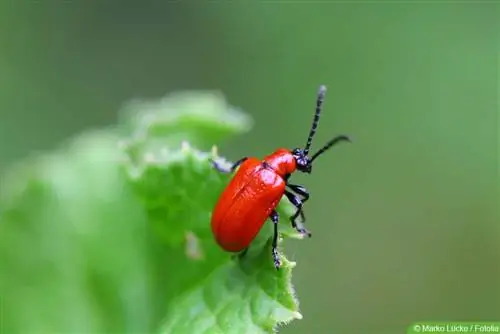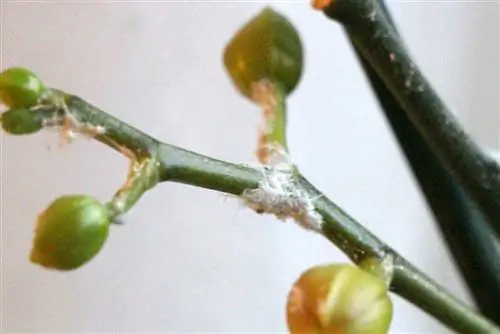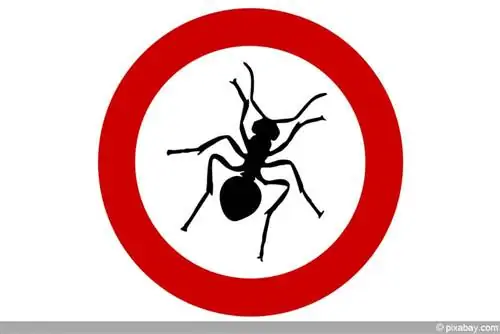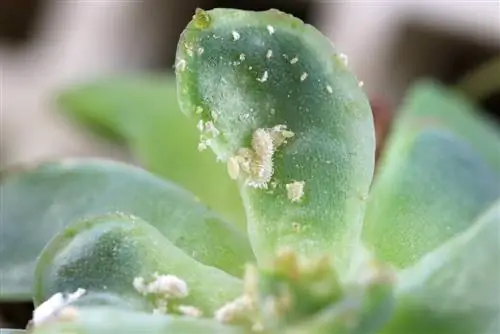- Author admin caroline@plants-knowledge.com.
- Public 2023-12-17 03:39.
- Last modified 2025-06-01 06:48.
In our latitudes there are around 650 different species of aphids, which grow between two and eight centimeters in size and are either green, black, yellowish, reddish or mealy light gray in color. A distinction is made between different types of green aphids, for example the green apple aphid (Aphidula pomi), the rose aphid (Macrosiphum rosae) or the green peach aphid (Myzus persicae). However, the animals do not differ significantly in the way they fight. Aphids prefer to gather on young shoots and on the undersides of leaves, but often also on buds. The typical damage pattern includes heavily rolled, curled or blistered leaves. These are covered by a sticky substance, which is the aphid excretions known as honeydew. In the case of an advanced infestation, sooty mold or black mold fungi often colonize the affected plants and further weaken them.
How do you recognize an aphid infestation?
Overview of possible damage caused by an aphid infestation:
- Leaves curl up and/or curl
- Leaves and buds make a sickly, stunted impression
- Leaves and buds are sticky
- Leaves and buds are covered with a blackish, wipeable coating
- There are small, crawling animals or bumps on the underside of the leaves/buds
- There are a noticeable number of ants under and on certain plants
Tip:
Ants are a clear indication of advanced aphid infestation
Are you wondering about the many ants in your garden that just won't go away despite numerous antidotes? The cause of this could be an advanced, even very severe infestation of your plants with (green) aphids. Ants love the sweet excretions of the plant suckers and “keep” entire colonies of aphids like we keep dairy cows. If there are a noticeable number of ants in and around certain plants, there is often an aphid infestation behind them.
Aphids overwinter on host plants
Particularly after mild, rather dry winters, a possible aphid infestation becomes apparent in early spring. As a rule, the animals' eggs overwinter on the host plants, from which the first aphids hatch as a result of the increasing heat in spring - and then multiply rapidly. It only takes a single week for a newly hatched aphid to develop into an adult that is able to fly and is extremely eager to reproduce. Normally, adult aphids do not survive the winter; unless it was rather mild. The more of these animals overwinter, the larger the aphid population will be the following spring - and the more work you will have to invest in targeted prevention. In general, it is better to prevent an infestation rather than having to laboriously fight it at some point. With these tips you can keep aphid infestations low from the start.
Prevention in spring
This includes treating endangered plants (especially those that were already severely infested last year!) as a preventive measure after a mild winter. Various remedies are suitable for this, for example those based on neem or tea tree oil as well as plant-strengthening decoctions made from nettles, garlic, onion peel or horsetail. The plants should be sprayed regularly with the products mentioned when budding begins. It is best to take this measure in the morning on a sunny and dry day. The leaves can then dry out during the day, as moisture at night in particular often results in fungal diseases.
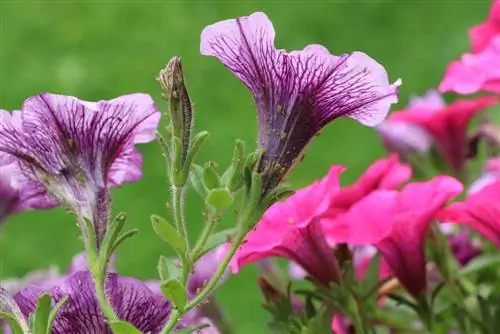
Mixed culture in the garden prevents pests
Monocultures are extremely deadly in the event of a pest infestation, as pathogens and pests can multiply particularly quickly. For this reason, you should cultivate a well-thought-out mixed culture in the garden by planting different species together in both the ornamental and vegetable beds. Of course, not all plants complement each other equally well, and the common green aphids attack many different plant species. However, there are some plants that these annoying little animals don't like and therefore try to avoid. To avoid aphids, plant these species:
- Nasturtiums around fruit trees and vegetable beds
- Onions, garlic and leeks between other vegetables
- Lavender in ornamental and bordering vegetable beds
Roses and lavender
It is probably well known that aphids have a special soft spot for roses. Many hobby gardeners have also heard that the pests don't like the smell of lavender. Roses and lavender also go well together for aesthetic reasons - but less so in view of their very different needs. Roses require nutrient-rich, moist soil, while lavender, as a Mediterranean plant, prefers poor, dry soil. So don't plant the two directly together, but at a certain distance from each other. You can also spray your roses with a mixture of lavender oil and water, this has an even better effect on the aphids.
Install insect hotel in the garden
Aphids - whether green, black or brown - are pretty low down in the food chain and serve as food for many animals, especially insects. By setting up an insect hotel in your garden and generally farming in an animal-friendly manner (for example through natural farming), you will attract many of these beneficial insects - which in turn will return the favor and kill the aphids in good time. Insect hotels can be built yourself with few resources and little manual skills.
Use beneficial insects in a targeted manner
If there is still a lack of hungry earwigs etc. in your garden, you can also purchase them and release them specifically to the affected plants. This method naturally works particularly well in greenhouses, but also outdoors or in indoor cultivation. Suitable beneficial insects to ward off green aphids are:
- Ladybird of the species Adalia bipunctata
- Parasitic wasps of the species Aphelinus abdominalis
- Parasitic wasps of the species Aphdius colemani
- Parasitic wasps of the species Aphidus ervi
- Parasitic wasps of the species Aphidus matricariae
- lacewings of the species Chrysoperla carnea
Fertilize correctly
If you want to prevent aphids in advance, you should fertilize your plants very carefully and, above all, exactly according to their needs and according to the manufacturer's instructions. Above all, excessive fertilization with nitrogen increases the susceptibility of plants to aphid infestation. For this reason, it is best for garden owners to have their soil examined by a testing laboratory and concrete advice for optimal fertilization or fertilizer composition is recommended. Anyone who fertilizes with organic materials should be particularly careful with manure and horn shavings: both are often very high in nitrogen.
Proven home remedies for green aphids
- Instead of chemistry -
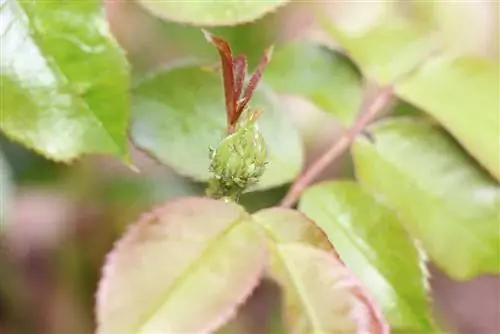
However, if the aphids have already conquered your plants, you should intervene as quickly as possible. A mild infestation can usually be combated just as easily. If, on the other hand, the animals have already multiplied diligently, stronger guns have to be brought out. However, try to use proven home remedies or biological remedies first: the chemical club not only kills the unwanted green aphids, but also all sorts of useful creatures, including garden birds. In addition, the use of toxic chemical pesticides is not advisable, especially in kitchen gardens, as this makes vegetables, herbs and fruits inedible for humans.
Tip:
Use home remedies continuously - be patient when fighting
When using home remedies against aphids, however, you should be patient, because only repeated and regular use promises lasting success. A single spraying, for example with nettle tea, has no effect at all or only a very short-term effect. However, you can use plant decoctions made from nettle, yarrow or onion peels for watering throughout the entire growing season: These products not only drive away aphids, but also have a general plant-strengthening effect and provide the garden with additional nutrients.
Mechanical action in case of light infestation
If the aphid infestation is still small, you can simply wash them off with a strong jet of water in the shower, especially on houseplants. To do this, use water that is as cold as possible and a hard shower jet. The leaves should then be able to dry quickly, but not in the blazing sun - this will only cause burns.
Organic plant extracts from our own production
Plant decoctions made from nettles, field horsetail, yarrow, garlic and/or onion peel have proven to be very effective. In case of aphid infestation or as a prevention, water or spray the plants about every two weeks between April and October with a home-made infusion. And this is how you make such a decoction:
- Coarsely chop freshly picked plant parts
- use individual species or a mixture
- Boil the onion peels and garlic, then cool and let stand for a week
- Only pour water over the nettles, horsetail and yarrow
- also leave it for a week
- stir daily
- strain and bottle
Cold coffee against sucking pests
Coffee is not just a drink for people, it is also good for your plants in several ways. If you water or spray plants infested with aphids, the caffeine they contain will drive the animals away. Dried coffee grounds, on the other hand, not only help against pests, but also make an excellent fertilizer. The same applies to black tea, although coffee is much more effective.
Soap solution for stubborn cases
A solution of water, a few drops of dishwashing liquid and a little rapeseed oil helps not only against aphids, but also against other plant lice such as mealybugs and mealybugs. Apply this mixture directly to the affected areas and repeat the procedure for several consecutive days: both the adult aphids and their eggs and offspring will suffocate. But be careful: not all plants can tolerate such treatment and will die themselves!
Powder affected leaves with rock dust
Powdering the affected leaves, shoots and buds with fine rock dust has the same effect as in the eighth point. However, this procedure is quite time-consuming and is only worthwhile if aphids are beginning to infest them.
Spray treatment with vinegar
The mixture of one third of conventional household vinegar (vinegar essence) and two thirds of low-lime water (e.g. rainwater or distilled water), when used as a spray treatment, also helps against green aphids and other plant sap-sucking pests. However, this remedy is not advisable inside the home as the sharp smells of vinegar can irritate the mucous membranes and respiratory tract.
Milk-water mixture also helps against mildew
Mix one part fresh whole milk (not long-life milk!) and nine parts low-lime water and spray your plants with it. This remedy not only helps against plant sap-sucking parasites - it can also be used wonderfully to combat powdery mildew. In this case, the lactic acid bacteria contained in fresh milk become effective, which is why pasteurized and highly heated milk is not suitable.
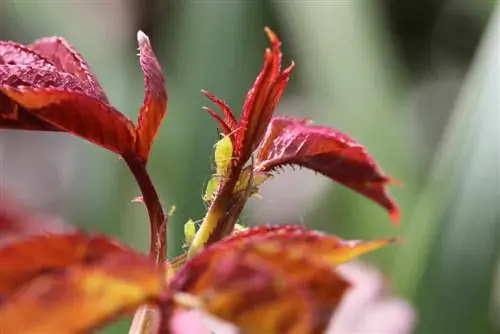
Prune severely infested plants in a targeted manner
In some cases, especially with a severe infestation, only radical pruning can help, provided you want or have to forego the chemical treatment. Especially in the garden, many perennials can be cut back close to the ground in autumn so that neither adult aphids nor their eggs can overwinter on the host. However, this admittedly drastic step is only recommended for plants that will sprout again in the spring. However, you can remove individual plant parts that are heavily infested with aphids at any time.
Suitable chemical remedies against aphids
- When nothing else helps -
However, if nothing else can help and the aphid populations are getting out of hand, your last resort is to use the chemical club. Please keep in mind, however, that although these remedies initially have a resounding effect - if used over a long period of time, they can actually cause the opposite, namely a recurring and ever-increasing aphid infestation. However, you don't have to resort to drastic measures straight away, neem or tea tree oil have also proven to be very effective - and are significantly gentler on people and the environment.
Neem or Niem
Neem or neem oil is a purely organic product that is obtained from the seeds of the neem tree, which comes from India. The preparation is not only suitable for use against aphids, but also combats numerous other pests and even fungicidal plant diseases. Neem oil is not used pure, but diluted with water as a spray. Spray plants in the morning for either treatment or prevention of aphids, preferably not during rain or strong sunshine. Neem oil should be used very sparingly, but there are ready-to-use mixtures available commercially.
Tea tree oil
Diluted tea tree oil is also excellent against aphids and other pests as well as against fungi. When mixing water and oil (whether it is canola, neem or tea tree oil), remember that in this case you will need a dispersing agent. A few drops of dishwashing liquid, for example, but also fresh whole milk are suitable for this. Oil should never be applied undiluted to plants, as such treatment can quickly become fatal and the plant will ultimately die.
Pesticides from various manufacturers
Lastly, there are of course numerous pest control products available in stores. However, for the reasons already mentioned, these should only be used if you have no other options left - for example because the infestation has already progressed too far or all home remedies against aphids have proven to be ineffective. When purchasing, make sure to purchase a product specifically against (green) aphids - these are more effective. Be sure to follow the manufacturer's instructions and specifications regarding application and dosage, and only use these products outdoors.

